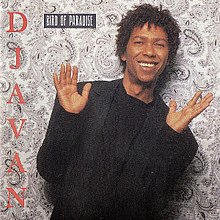| Bird of Paradise | ||||
|---|---|---|---|---|
 | ||||
| Studio album by Djavan | ||||
| Released | 1988 | |||
| Genre | Samba | |||
| Label | Columbia | |||
| Producer | Ronnie Foster | |||
| Djavan chronology | ||||
| ||||
Bird of Paradise is an album by the Brazilian musician Djavan. It was released in 1988 via Columbia Records, part of a Brazilian push by the label that also included albums by Milton Nascimento (Yauaretê) and Simone (Vicio).
Production
The album was produced by Ronnie Foster. Three of its songs are sung in English; Djavan had others write the lyrics to them. Djavan recorded the album in Los Angeles, using session musicians.
"Stephen's Kingdom", to which Stevie Wonder contributed, is about the South African township of Soweto.
Critical reception
| Review scores | |
|---|---|
| Source | Rating |
| AllMusic | |
| The Encyclopedia of Popular Music | |
| MusicHound World: The Essential Album Guide | |
| The Rolling Stone Album Guide | |
The Sun Sentinel wrote that Djavan's "voice is a clear, strong, masculine baritone, his guitar distinctly grounded in but not enslaved to the samba beat, the melodies are long, lilting, undulating lines rising above a plush, complex harmonic carpet." The Boston Globe thought that "Djavan's upbeat Anglo-Brazilian pop will appeal to West Coast jazz fusion fans as well as pop listeners."
The Washington Post determined that, "as slick and predictable as it is, though, the album is redeemed by a few of Djavan's lyrics, including the compulsive love song 'Madness' and the temptress tale 'Miss Susanna'." The New York Times concluded that, "as a singer, Djavan doesn't have the angelic, impeccable intonation of Mr. Nascimento or Mr. Veloso; he sounds a little more fallible and earthly, perhaps more approachable for American pop listeners." The Philadelphia Inquirer deemed the album "predictable, Westernized funk."
AllMusic called the album "full of strong, haunting, lusciously melodic songs often backed by that gently jumping, uplifting rhythm that runs through much of his material."
Track listing
| No. | Title | Length |
|---|---|---|
| 1. | "Carnaval in Rio (Carnaval no Rio)" | |
| 2. | "Bird of Paradise" | |
| 3. | "Apple (Maçã)" | |
| 4. | "Real" | |
| 5. | "Madness (Doidice)" | |
| 6. | "Stephen's Kingdom" | |
| 7. | "Bouquet" | |
| 8. | "Take Me (Me Leve)" | |
| 9. | "I Will, I Won't (Dou-Não-Dou)" | |
| 10. | "Miss Susanna" |
References
- McGowan, Chris; Pessanha, Ricardo (December 20, 1998). The Brazilian Sound: Samba, Bossa Nova, and the Popular Music of Brazil. Temple University Press. ISBN 9781566395458.
- "As Brazilian pop...". USA Today. 30 June 1988. p. 1D.
- "Djavan Biography, Songs, & Albums". AllMusic.
- Casuso, Jorge (31 July 1988). "A Touch of Jazz from Brazil". Arts. Chicago Tribune. p. 27.
- ^ Joyce, Mike (22 July 1988). "Boss Nuova Music: Best of New Brazil". The Washington Post. p. N21.
- Duncan, Amy (31 Aug 1988). "A major Brazilian star reaches out to the US". Arts. The Christian Science Monitor.
- Stewart, Zan (17 Sep 1988). "Brazil's Djavan Would Like to Sing to the World". Calendar. Los Angeles Times. p. 2.
- ^ Larkin, Colin (2006). The Encyclopedia of Popular Music. Vol. 3. MUZE. p. 48.
- Nix, Phyllis (Nov 1988). "The Sound of Brazil". The Crisis. p. 8.
- ^ "Bird of Paradise". AllMusic.
- MusicHound World: The Essential Album Guide. Visible Ink Press. 2000. p. 223.
- The Rolling Stone Album Guide. Random House. 1992. p. 203.
- Ginell, Richard S. (23 Sep 1988). "Djavan Lets Brazilian Sound Soar on Own Merits". Features Showtime. Sun Sentinel. p. 18.
- Gonzalez, Fernando (14 Aug 1988). "Time Is Now for Brazilian Music". The Boston Globe. p. A4.
- Pareles, Jon (25 Sep 1988). "A Brazilian-American Cultural Exchange". The New York Times. p. A64.
- Moon, Tom (21 Oct 1989). "Brazil's Djavan Brings Conflicting Styles to U.S.". The Philadelphia Inquirer. p. D5.
| Djavan | |
|---|---|
| Albums |
|